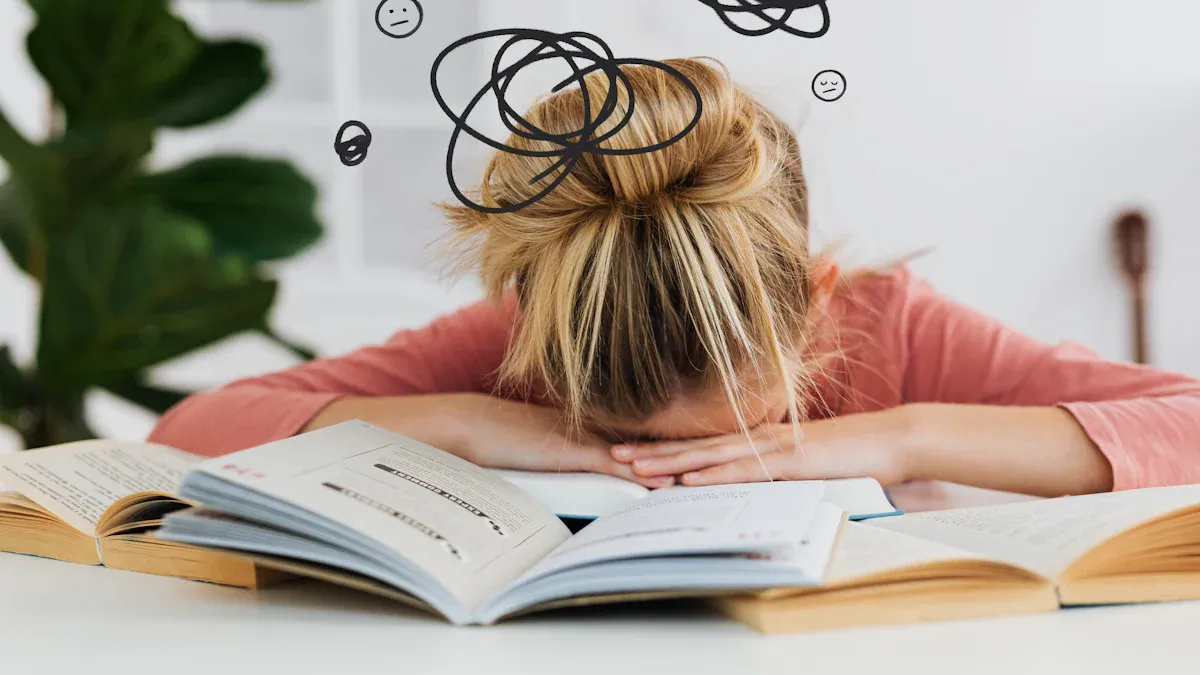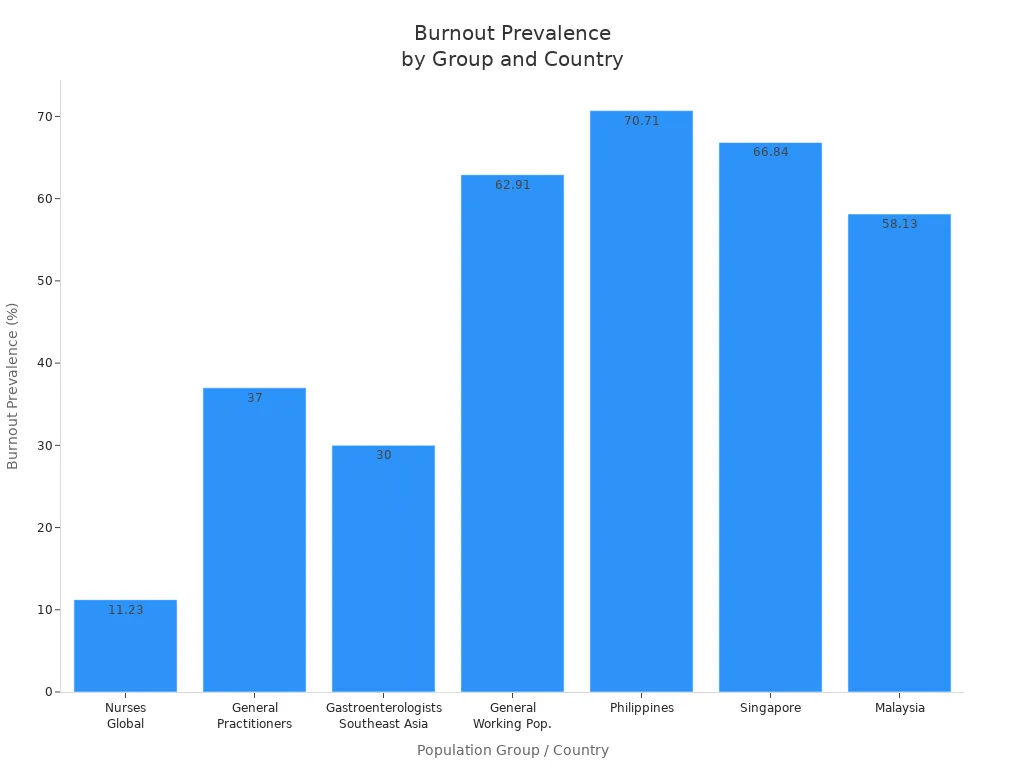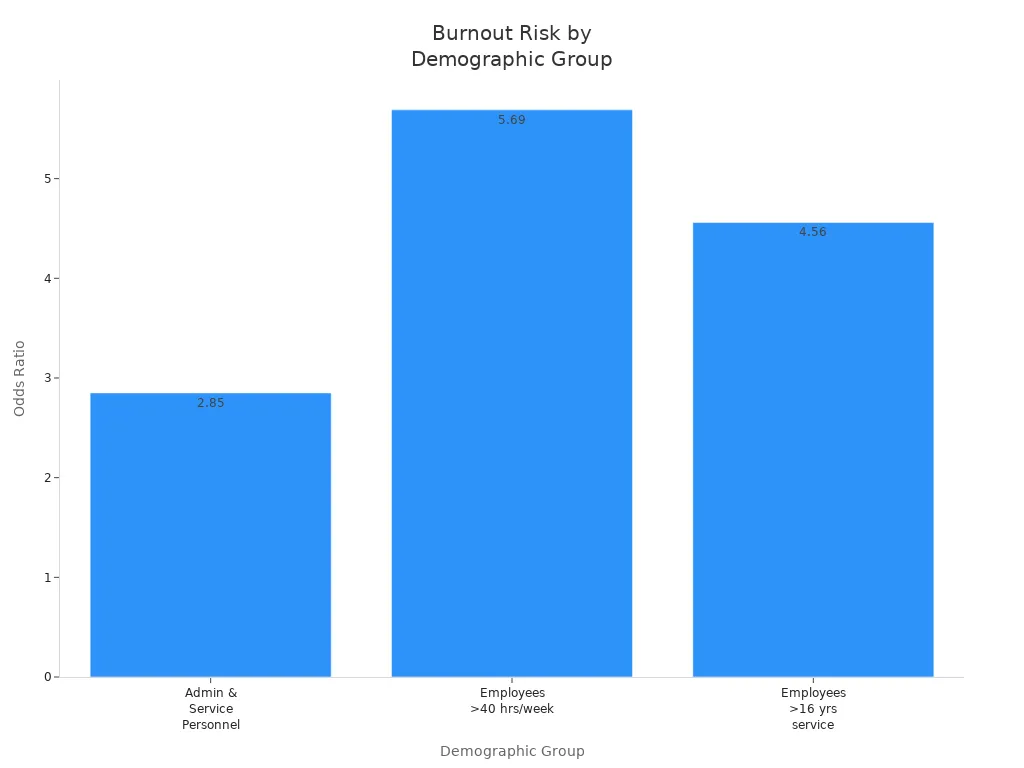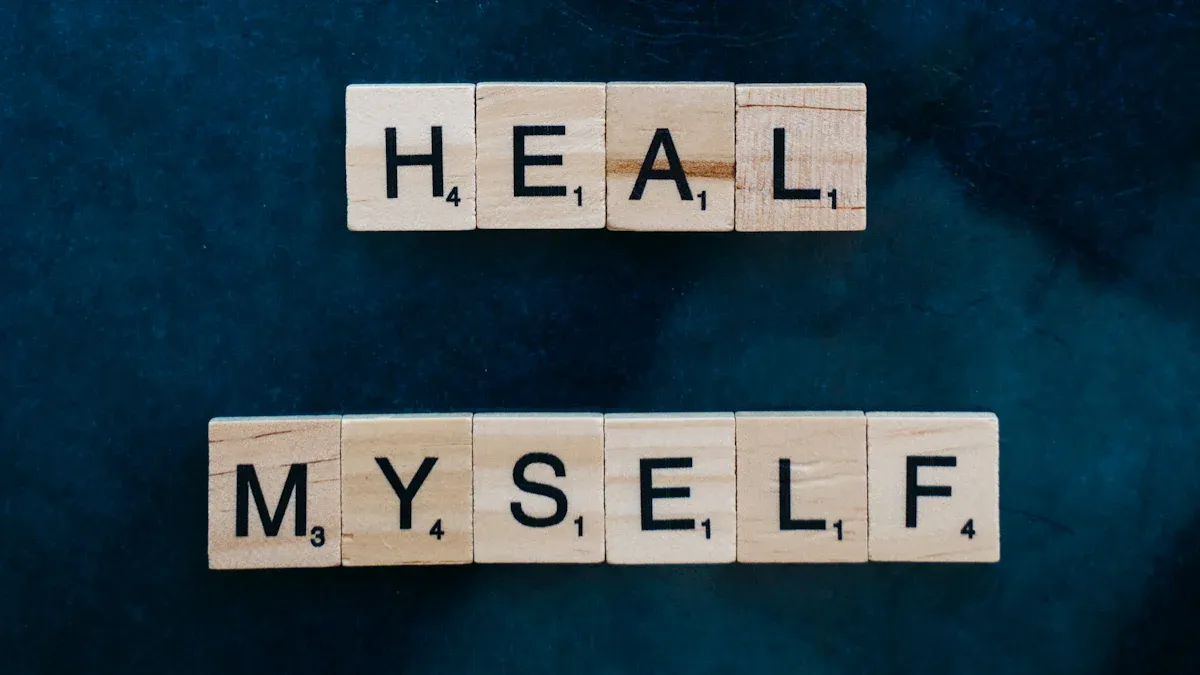The Hidden Signs of Burnout and How to Cope
Zoey
You might feel tired or stressed. You may even feel disconnected. You might not know you have burnout. Burnout can happen to anyone. It affects people all over the world. In Southeast Asia, more than 60% of full-time workers feel this way. Some countries have even higher numbers.
Population Group |
Region/Countries |
Burnout Prevalence (%) |
|---|---|---|
General Working Population |
Southeast Asia (4 countries) |
|
- Philippines |
Southeast Asia |
70.71 |
- Singapore |
Southeast Asia |
66.84 |
- Malaysia |
Southeast Asia |
58.13 |

You may not see the hidden signs at first. These signs can sneak up on you. They can look like headaches or sleep problems. You might also feel numb. If you notice these signs early, you can protect yourself. This can help stop burnout from getting worse.
Key Takeaways
Burnout looks like feeling tired all the time, feeling nothing, and having a hard time paying attention. Rest does not make it better. People who have too much work, no help, or do not take care of themselves can get burnout more easily. Burnout can hurt your body, feelings, actions, and thoughts. It makes daily things harder and can make you feel sad. You can help burnout by making rules, taking care of yourself, and asking others for help. You can stop burnout by keeping work and life even, staying close to others, and using good habits to stay healthy.
Understanding Burnout
What Is Burnout
You might hear people talk about burnout, but what does it really mean? Burnout is not just feeling tired after a long day. It is a real problem that happens when you face prolonged stress, especially at work. Since 1974, experts have tried to define burnout in many ways. Most agree that it is a mix of three main things: feeling exhausted, becoming distant or negative about your job, and thinking you are not doing well at work.
Burnout is different from regular stress or being tired. It sticks around and makes you feel worse over time. You might notice some common signs of burnout, like feeling empty, having trouble sleeping, or not caring about your job anymore. These feelings do not go away with a good night’s sleep. They can affect your health, your mood, and even your relationships.
Here are some signs of burnout that set it apart from normal stress:
You feel detached or numb at work.
You think your work does not matter.
You feel anxious, sad, or easily annoyed.
Your job satisfaction drops a lot.
These feelings last for weeks or months.
Burnout is not a medical diagnosis, but it is a serious problem that can hurt your well-being if you ignore it.
Who Is at Risk
Anyone can experience burnout, but some people face a higher risk. If you work long hours, have a stressful job, or do not feel supported, you might notice the signs of burnout sooner. People who work more than 40 hours a week or have been in the same job for many years are more likely to feel worn out. Men and people in service or administrative jobs also face higher risks.

Your lifestyle can also play a big part. If you do not eat well, skip breakfast, or do not get enough exercise, your risk goes up. Health problems like heart disease or trouble sleeping can make burnout worse. Social life matters too. If your friends or coworkers feel burned out, you might start to feel the same way.
Tip: Pay attention to your habits and how you feel at work. Noticing the early signs of burnout can help you take action before things get worse.
Hidden Signs of Burnout
Burnout can sneak up on you. Sometimes, you might not notice the hidden signs right away. These signs can look like normal stress or tiredness, but they often mean something more. Let’s break down the hidden signs of burnout so you can spot them early and take action.
Physical Signs
Your body often gives you the first clues. You might feel tired all the time, even after a full night’s rest. This exhaustion can make simple tasks feel hard. Many people with burnout notice headaches, stomach problems, or even body aches that don’t go away. You may get sick more often because your immune system gets weaker. Changes in appetite, high blood pressure, and trouble sleeping are also common signs of burnout.
Recurring headaches or body aches
Stomach or bowel issues
Sleep problems, like insomnia or restless nights
Getting sick more often than usual
Changes in how much you eat
High blood pressure
Note: These symptoms often show up most days for at least two weeks and can last even longer if you don’t get enough rest or support.
It’s easy to think these signs are just part of a busy life. But if you notice them sticking around, it’s time to pay attention.
Emotional Signs
Burnout doesn’t just affect your body. It also changes how you feel. You might notice you feel empty or numb. Emotional exhaustion is a big part of burnout. You could start to feel disconnected from your work or the people around you. Some people feel more irritable or snap at others for small things. You might lose interest in things you used to enjoy.
Feeling anxious or sad
Losing motivation or hope
Burnout can look a lot like anxiety or depression, but it usually builds up slowly over time. You might feel more self-critical or just want to shut down. If you notice these emotional changes, don’t ignore them. They are hidden signs that you need to take care of yourself.
Behavioral Signs
Your actions can also show hidden signs of burnout. You might start to pull away from friends or family. Maybe you stop doing things you used to love. Some people find themselves procrastinating or avoiding work. You might make more mistakes or feel less interested in your job. Sometimes, you might even call in sick just to get a break.
Procrastinating or putting off tasks
Making more errors at work or school
Losing interest in hobbies or work
Becoming more irritable with others
Missing work or school more often
Some people turn to unhealthy coping habits, like drinking too much caffeine, eating junk food, or even using alcohol. These habits might seem to help at first, but they can make burnout worse in the long run.
Tip: Notice if you’re using things like caffeine or snacks to get through the day. These can be signs that you’re trying to cope with burnout in unhealthy ways.
Mental Signs
Burnout can make it hard to think clearly. You might have trouble focusing or remembering things. Tasks that used to be easy can start to feel overwhelming. You may find it hard to solve problems or switch between tasks. Sometimes, you forget names, appointments, or even what you were just doing.
Slower thinking or problem-solving
Feeling stuck or unable to finish tasks
These mental signs can hurt your daily life and make you less productive. You might feel like you can’t keep up, which adds even more stress. If you notice these changes, it’s important to take a step back and give yourself time to rest.
Remember: The hidden signs of burnout are often subtle. They can look like everyday stress, but they last longer and affect many parts of your life. Spotting these signs early can help you recover faster and protect your well-being.
Mental Health Impact
Effects on Well-Being
Burnout is more than just feeling tired. It can change many parts of your life. Your mental health can be affected in ways you might not expect. When you have burnout, you may feel anxious or very tired. Your body can hurt too. You might get headaches or muscle pain. Sleeping can become hard. Sometimes, you get sick more often. It can also be tough to focus at school or work.
Here are some things you might notice right away:
Feeling very tired or sad
Not sleeping well or having headaches
Muscle pain or stomach aches
Hard time paying attention
Getting annoyed or upset easily
Getting sick more than usual
If burnout does not go away, it can cause bigger problems. Over time, you might get health issues like heart disease. Your mental health can get worse. You could feel depressed or anxious. Your friendships and family life can suffer. Some people want to quit their jobs or leave school.
Long-term effects can include:
Higher chance of heart disease
Ongoing problems like depression or anxiety
Trouble with friends, family, or coworkers
Leaving work or school early
If you see these signs, talking to someone about mental health can help you feel better and keep you safe.
Difference from Stress and Depression
You might wonder how burnout is different from stress or depression. These problems can look the same, but they are not. Burnout usually comes from too much work or school stress for a long time. Depression is a mental health problem that affects your whole life, not just work or school.
Here’s a simple table to show the differences:
Aspect |
Burnout |
Chronic Stress |
Clinical Depression |
|---|---|---|---|
What it is |
Exhaustion from long-term stress in one area |
Ongoing stress that can lead to burnout |
Deep sadness and hopelessness for at least 2 weeks |
Main cause |
Too much work, school, or caring for others |
Life pressures that don’t go away |
Family history, brain chemistry, trauma |
Main feeling |
Tired, irritable, negative |
Worry or tension |
Sadness, hopelessness, loss of interest |
How long it lasts |
Gets better with rest and self-care |
Lasts as long as the stress is there |
Lasts for weeks or months, affects all areas |
Treatment |
Rest, boundaries, self-care, support |
Stress management |
Therapy, medication |
Burnout and depression can both make you feel tired and sad. Burnout often gets better if you rest or change your routine. Depression usually needs more help, like therapy or medicine. Knowing the difference between burnout and depression helps you get the right support for your mental health.
Causes and Risk Factors
Workplace Triggers
You might think burnout only happens when you work too much, but the real story is more complex. Many things at work can trigger burnout. Here are the top reasons:
Unfair treatment at work—If you feel like your boss or coworkers treat you unfairly, you are more than twice as likely to feel burned out.
Unmanageable workload—When you have too much to do, you can lose confidence and feel overwhelmed.
Lack of role clarity—If you do not know what your boss expects, you may feel tired and confused.
Lack of communication and support from managers—Supportive managers can lower burnout risk by about 70%. Without support, you might feel alone.
Unreasonable time pressure—Tight deadlines and not enough time make burnout much more likely.
You can see that burnout is not just about working hard. It is also about how you are treated and how much control you have. When you have a heavy workload and little control, you feel more exhausted. If you have more say in your job, you can handle stress better and avoid burnout.
Personal Life Stressors
Your life outside of work matters, too. Family and money problems can make burnout worse. Here are some common stressors:
Financial stress makes it harder to handle family duties.
Lack of social support can make you feel alone.
Tough family situations, like caring for a sick child or dealing with arguments, add to your stress.
Working parents often feel pulled between home and job.
The COVID-19 pandemic made things even harder for many families.
If you do not have help or time to rest, you may feel tired all the time. These stressors can drain your energy and make burnout more likely.
Personality and Habits
Some people are more likely to get burnout because of their personality or habits. If you worry a lot or feel anxious, you might notice burnout sooner. People who want everything to be perfect often push themselves too hard. They may have trouble setting limits or asking for help. Poor work-life boundaries make it hard to relax, even at home.
Traits like being very careful, needing things to be just right, or feeling unsure without others’ help can raise your risk. If you avoid problems or hold in your feelings, you might feel even more tired. On the other hand, if you are outgoing and can talk about your feelings, you may be less likely to burn out.
Tip: Notice your habits and how you handle stress. Setting clear boundaries and asking for help can protect you from burnout.
What to Do About Burnout

Immediate Steps
When you first notice burnout, you might feel lost or overwhelmed. You can take action right away to start feeling better. Here are some steps you can try:
Lighten your workload. Look at your tasks and decide what matters most. Say no to extra work when you can. Ask others to help or share the load.
Set boundaries. Protect your time by turning off work emails after hours. Let people know when you are not available. This helps you keep work and home life separate.
Practice self-care. Make sure you get enough sleep, eat healthy foods, and move your body. Even a short walk or a few minutes of stretching can help.
Take small breaks. Step away from your desk or workspace for a few minutes. Try deep breathing or a quick meditation to calm your mind.
Seek support. Talk to friends, family, or coworkers about how you feel. Sharing your thoughts can make things feel lighter.
Ask for help. If you feel stuck or very down, reach out to a mental health professional. They can guide you and offer new coping skills.
Be kind to yourself. Remind yourself that it is okay to take breaks and say no. You do not have to do everything at once.
Remember: Prioritizing rest is not selfish. It is a key part of recovery and helps you stay strong.
Healthy Coping Strategies
You can build healthy habits to manage burnout and support your recovery. These coping strategies work for many people:
Move your body. Regular physical activity, like walking, biking, or yoga, can boost your mood and energy. Exercise helps your body recover from stress and improves sleep.
Eat well. Choose foods that give you energy and help your body heal. A balanced diet supports your mind and body.
Practice mindfulness. Try meditation, deep breathing, or journaling. These activities help you notice your feelings and calm your thoughts.
Connect with others. Join a support group or talk with people who understand what you are going through. Sharing your story can help you feel less alone.
Reflect on your goals. Think about what matters most to you. This can help you find meaning in your work and life.
Use therapy if needed. Talking to a counselor or therapist can help you learn new ways to handle stress. Therapy like CBT can teach you how to change negative thoughts.
Celebrate small wins. Notice your progress, even if it feels tiny. Every step counts in your recovery.
Tip: Self-care in small ways, like enjoying a hobby or spending time in nature, can make a big difference.
Try to avoid unhealthy coping habits. Too much caffeine, junk food, or alcohol can make burnout worse. If you notice these habits, ask for help or try new ways to cope.
Prevention Tips
You can lower your risk of burnout by making a few changes at work and home. Here are some health tips and prevention ideas:
Prevention Strategy |
What You Can Do |
Why It Helps |
|---|---|---|
Focus on tasks you enjoy and find meaningful. |
Increases job satisfaction and lowers burnout risk. |
|
Taking time off |
Use vacation days or mini-breaks to recharge. |
Gives your mind and body a chance to rest. |
Work-Life Balance |
Keep work and home life separate. |
Reduces stress and helps you relax. |
Programmatic Interventions |
Join mindfulness or exercise programs, or try therapy-based workshops. |
Builds coping skills and emotional strength. |
Social Support |
Stay connected with friends, family, or coworkers. |
Makes you feel supported and less alone. |
Ask for clear roles, fair workloads, and recognition at work. |
Creates a healthy work environment. |
|
Sustainable Habits |
Keep up with self-care, hobbies, and learning new things. |
Supports long-term well-being and recovery. |
You can also help prevent burnout by setting boundaries and using your voice. Let your boss or teachers know when you need help or when your workload is too much. Take regular breaks and use your time off to rest. Try to keep a balance between work, school, and fun.
Note: If you ever feel like burnout is too much to handle alone, seeking support from a professional is a smart and brave step.
Building resilience takes time. You can start with small changes and add more as you feel ready. Remember, you are not alone. Many people have faced burnout and found ways to recover. You can too.
You can spot burnout early if you pay attention to your mental health. Taking action right away makes recovery easier. You do not have to face this alone. Reach out for help from friends, family, or a professional. Your mental health matters. Small steps can lead to recovery. If you need more help, look for mental health resources in your area. Remember, support is always there for you.
FAQ
What is the first thing I should do if I think I have burnout?
Take a break. Step back from your work or daily routine. Give yourself time to rest. Talk to someone you trust. You do not have to fix everything at once.
Can burnout go away on its own?
Burnout usually does not go away by itself. You need to make changes in your life. Rest, set boundaries, and ask for help. These steps help you recover faster.
How can I talk to my boss about burnout?
Be honest and clear. Tell your boss how you feel. Use simple words. You can say, “I feel very tired and stressed. I need some support.” Most bosses want to help.
Are there quick ways to feel better during a tough day?
Yes! Try these:
Take a short walk
Drink water
Breathe deeply for one minute
Even small breaks can help your mind and body reset.



